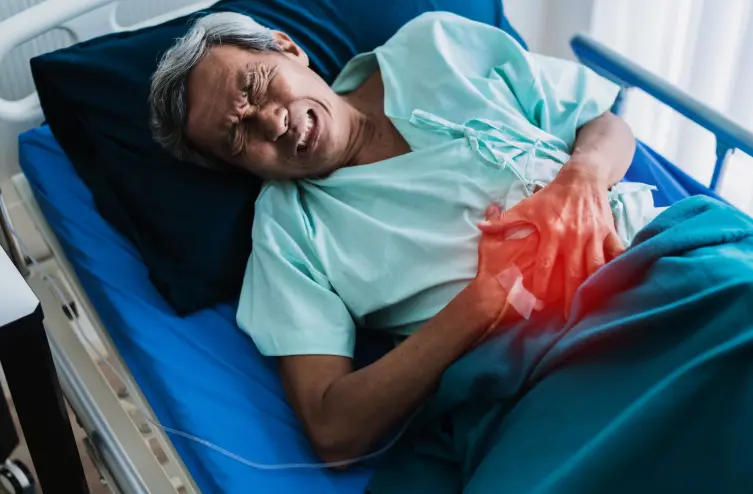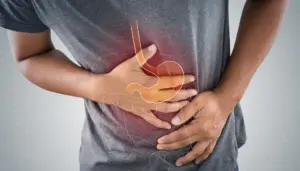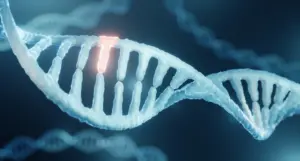Comprehensive Diagnosis and Treatment for Gastric Cancer
Gastric Cancer in Chennai VS Hospitals offers advanced diagnosis, personalized treatment plans, expert oncologists, and comprehensive care for better outcomes.

Gastric cancer, also known as stomach cancer, develops when malignant cells form in the lining of the stomach. It often goes undetected in its early stages because the symptoms are not always noticeable. However, with advancements in medical technology and treatment, gastric cancer can be managed effectively, especially if detected early. This article provides information on the signs, symptoms, risk factors, diagnosis, treatment options, and preventive measures for gastric cancer, as well as the specialized services available at VS Hospitals, one of Chennai’s leading healthcare providers.

Early Detection Saves Lives
Early detection and treatment are crucial for improving the chances of survival. If you notice any concerning symptoms, consult a healthcare provider immediately.
Signs and Symptoms
Persistent Stomach Pain
Pain or discomfort in the stomach that doesn’t go away and worsens with time.
Nausea and Vomiting
Feeling nauseous or vomiting, particularly after eating, may indicate the presence of gastric cancer.
Difficulty Swallowing
Difficulty swallowing food, particularly solid foods, may occur if the cancer obstructs the stomach.
Unexplained Weight Loss
Losing weight without trying can be a symptom of gastric cancer, especially if combined with other gastrointestinal symptoms.
Loss of Appetite
A noticeable decrease in appetite or feeling full after eating only a small amount of food.
Indigestion or Heartburn
Chronic indigestion or heartburn that does not improve with over-the-counter medications.
Bloody Stool or Vomit
If the cancer causes bleeding in the stomach, it may result in blood in the stool (which can appear black and tarry) or vomit that looks like coffee grounds.
Fatigue
Persistent tiredness or weakness, even with adequate rest.
Blood in Urine
Hematuria - pink, red, or dark urine, the most common symptom
Frequent Urination
Feeling the need to urinate frequently, even when bladder is not full
Painful Urination
Experiencing pain or burning sensation while urinating
Back or Pelvic Pain
Pain that occurs as the cancer grows and spreads
Unexplained Weight Loss
Significant weight loss not related to diet or exercise
Fatigue
Feeling unusually tired or weak without a clear cause
Meet Our Expert Gastric Cancer Oncologists
Risk Factors
Smoking
Smoking is one of the leading causes of bladder cancer. Chemicals in tobacco smoke can damage the lining of the bladder, increasing the risk.

Gender
Men are at a higher risk of developing bladder cancer than women.

Chronic Bladder Infections or Inflammation
Conditions such as bladder infections and long-term bladder inflammation can increase the risk.

Exposure to Chemicals
Prolonged exposure to certain chemicals, especially those used in the dye industry, rubber production, and chemical manufacturing, increases the risk.

Age
Gastric cancer is more common in people over the age of 60. The risk increases as a person gets older.

Gender
Men are more likely than women to develop gastric cancer.

Family History
A family history of gastric cancer or other types of gastrointestinal cancers may increase the risk.

Helicobacter Pylori Infection
Infection with the bacteria Helicobacter pylori (H. pylori), which causes stomach ulcers, is a known risk factor for gastric cancer.

Dietary Factors
Diets high in smoked, salted, or pickled foods, and low in fresh fruits and vegetables, are linked to a higher risk of gastric cancer.

Smoking
Smoking increases the risk of developing many types of cancer, including gastric cancer, particularly in the upper part of the stomach.

Previous Stomach Surgery
Having had surgery for a condition such as stomach ulcers or stomach polyps may increase the risk of developing gastric cancer later in life.

Obesity
Being overweight or obese increases the risk of stomach cancer, particularly for cancers of the upper part of the stomach.

Genetic Mutations
Certain inherited conditions, such as hereditary non-polyposis colorectal cancer (HNPCC) or familial adenomatous polyposis (FAP), may increase the risk of gastric cancer.

Advanced Cancer Treatment Options
Diet and Nutrition
Prevention
Diagnosis
Key Services
Key Facilities
Nutrition plays a vital role in reducing the risk of gastric cancer and supporting treatment. A balanced and healthy diet can help improve the immune system, decrease inflammation, and reduce cancer risks. Here are some dietary recommendations:
- Increase Intake of Fruits and Vegetables: A diet high in fruits and vegetables provides antioxidants and nutrients that may help prevent the development of gastric cancer. Vegetables like broccoli, cabbage, and carrots are particularly beneficial.
- Limit Processed Foods: Processed meats, such as bacon, sausages, and hot dogs, should be limited, as they are linked to an increased risk of gastric cancer.
- Avoid Excess Salt: High salt intake can damage the stomach lining and increase the risk of gastric cancer. Opt for natural herbs and spices to flavor food instead of salt.
- Incorporate Whole Grains: Whole grains, including brown rice, quinoa, and whole wheat, provide fiber that may help reduce the risk of stomach cancer.
- Increase Fiber Intake: Fiber-rich foods, such as legumes, oats, and flaxseeds, can support digestive health and potentially lower the risk of gastric cancer.
- Moderate Alcohol Consumption: Excessive alcohol consumption is linked to an increased risk of gastric cancer. Limiting alcohol intake can reduce this risk.
- Stay Hydrated: Drinking enough water throughout the day supports digestion and overall health, and may help flush out toxins that could potentially harm the stomach lining.
Adopting these dietary habits can help protect the stomach from cancer and support overall health, particularly for those undergoing treatment for gastric cancer.
While there is no guaranteed way to prevent gastric cancer, certain lifestyle changes and precautions can significantly reduce the risk. Here are some key preventive measures:
- Quit Smoking: Smoking is a major risk factor for gastric cancer. Quitting smoking can significantly reduce the risk of developing this disease.
- Reduce Alcohol Intake: Limiting alcohol consumption reduces the risk of gastric cancer and other types of cancers.
- Manage H. pylori Infection: Early treatment of Helicobacter pylori infection with antibiotics can help reduce the risk of gastric cancer. Speak with your doctor about testing and treatment.
- Adopt a Healthy Diet: Eating a diet rich in fruits, vegetables, and fiber while limiting processed foods and excessive salt can reduce cancer risk.
- Regular Screening: For those at higher risk of gastric cancer, such as those with a family history or H. pylori infection, regular screening and check-ups are recommended for early detection.
- Maintain a Healthy Weight: Obesity is a significant risk factor for gastric cancer, so maintaining a healthy weight through diet and regular exercise can help lower the risk.
- Vaccination Against HPV: Since the human papillomavirus (HPV) has been linked to some cases of gastric cancer, vaccination may help prevent the disease in certain high-risk populations.
By incorporating these preventive strategies, individuals can reduce their risk of gastric cancer and promote overall health.
The early detection of gastric cancer is crucial for effective treatment. Diagnostic tests are used to confirm the presence of gastric cancer and determine its stage. Common diagnostic methods include:
- Endoscopy: A flexible tube with a camera is inserted through the mouth to examine the stomach lining for signs of cancer. A biopsy may also be performed during this procedure to remove a tissue sample for testing.
- Biopsy: A biopsy involves removing a small tissue sample from the stomach to test for cancer cells. It is usually performed during an endoscopy.
- Imaging Tests: Imaging tests such as CT scans, MRI, and PET scans provide detailed images of the stomach and surrounding areas, helping to detect tumors and determine if cancer has spread.
- Blood Tests: Blood tests, including the complete blood count (CBC), can help detect abnormalities that may indicate gastric cancer or other health issues.
- Barium Swallow: This test involves swallowing a liquid containing barium, which highlights the stomach on X-rays and helps detect abnormal growths or blockages.
Early diagnosis using these methods helps doctors plan the best treatment approach for each individual case.
VS Hospitals offers comprehensive services for the diagnosis, treatment, and management of gastric cancer, ensuring that patients receive high-quality care throughout their journey. Key services include:
- Cancer Screening: Regular screenings for high-risk individuals to detect gastric cancer at an early stage.
- Surgical Oncology: Expert surgeons at VS Hospitals perform gastrectomy and other surgical procedures to remove tumors and affected tissues.
- Chemotherapy and Radiotherapy: VS Hospitals provides chemotherapy and radiation treatments tailored to the individual needs of each patient.
- Nutritional Support: Specialized dietitians offer guidance on nutrition during and after treatment to support recovery and overall health.
- Palliative Care: For patients with advanced gastric cancer, VS Hospitals offers palliative care to manage symptoms and improve quality of life.
- Multidisciplinary Care: The hospital’s team of oncologists, surgeons, gastroenterologists, and nutritionists work together to create a personalized treatment plan for each patient.
VS Hospitals is equipped with state-of-the-art facilities designed to provide comprehensive care for gastric cancer patients:
- Advanced Diagnostic Technology: The hospital uses cutting-edge diagnostic equipment, including CT, MRI, and endoscopy, to accurately diagnose gastric cancer.
- Surgical Suites: The hospital features modern surgical suites equipped with the latest technology to perform delicate gastric cancer surgeries with precision.
- Oncology Department: A dedicated oncology department with specialized cancer care units for chemotherapy, radiation therapy, and post-operative recovery.
- Comfortable Patient Rooms: Private, comfortable rooms provide a supportive environment for recovery, ensuring patient privacy and comfort during treatment.
- Rehabilitation Services: Physiotherapy, psychological support, and counseling services are available to help patients cope with the emotional and physical effects of cancer treatment.
Top Medical Facilities at Our Multispeciality Hospital – Here’s What Makes Us Different!
Ready to Begin Your Gastric Cancer Care Journey?
Learn More About Gastric Cancer Care
Frequently Asked Questions
The most common symptoms of gastric cancer include persistent stomach pain, nausea, vomiting, unexplained weight loss, and difficulty swallowing. If these symptoms persist, it’s crucial to seek medical attention promptly for early detection and treatment.
At VS Hospitals, gastric cancer is treated using a combination of surgery, chemotherapy, radiation therapy, and palliative care. A personalized treatment plan is developed based on the cancer’s stage and location, ensuring optimal outcomes for each patient.
While gastric cancer cannot be entirely prevented, adopting a healthy lifestyle by quitting smoking, limiting alcohol intake, maintaining a healthy weight, and eating a balanced diet can significantly reduce the risk. Regular screenings are also important for early detection.
